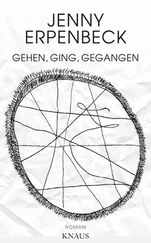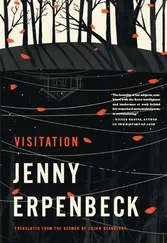Jenny Erpenbeck - The End of Days
Здесь есть возможность читать онлайн «Jenny Erpenbeck - The End of Days» весь текст электронной книги совершенно бесплатно (целиком полную версию без сокращений). В некоторых случаях можно слушать аудио, скачать через торрент в формате fb2 и присутствует краткое содержание. Год выпуска: 2014, Издательство: New Directions Publishing, Жанр: Современная проза, на английском языке. Описание произведения, (предисловие) а так же отзывы посетителей доступны на портале библиотеки ЛибКат.
- Название:The End of Days
- Автор:
- Издательство:New Directions Publishing
- Жанр:
- Год:2014
- ISBN:нет данных
- Рейтинг книги:4 / 5. Голосов: 1
-
Избранное:Добавить в избранное
- Отзывы:
-
Ваша оценка:
- 80
- 1
- 2
- 3
- 4
- 5
The End of Days: краткое содержание, описание и аннотация
Предлагаем к чтению аннотацию, описание, краткое содержание или предисловие (зависит от того, что написал сам автор книги «The End of Days»). Если вы не нашли необходимую информацию о книге — напишите в комментариях, мы постараемся отыскать её.
The End of Days — читать онлайн бесплатно полную книгу (весь текст) целиком
Ниже представлен текст книги, разбитый по страницам. Система сохранения места последней прочитанной страницы, позволяет с удобством читать онлайн бесплатно книгу «The End of Days», без необходимости каждый раз заново искать на чём Вы остановились. Поставьте закладку, и сможете в любой момент перейти на страницу, на которой закончили чтение.
Интервал:
Закладка:
*
So have things really come so far now that all she can do is hope that the members of the secret police who seized her husband and took him away in the name of political vigilance are merely traitors, enemies of the people, that they are Hitler’s people — possibly even high-ranking ones? Not only her husband but in fact every last one of the comrades whose arrests she’s been hearing about is someone she’s known well for years. She’s now almost certain: if Hitler himself proves to be her adversary even here in the capital of the Soviet Union, only then can the antifascists’ hope for a better world possibly survive their torture and death. Or is it perhaps that Stalin himself — disguised as Hitler, who in turn is disguised as Stalin, doubly masked, doubly veiled, and thus genuinely duplicitous — that Stalin himself is acting as his own agent and, out of fear that in a good world the hope for a better one might be lost forever, out of fear of stagnation, is now trying to murder the Communist movement back into hopefulness? Or perhaps that all of them together are dreaming a nightmare from which there will never be an awakening, and in this nightmare Stalin, the good father, creeps into the rooms where his children are sleeping with a knife in his hands.
Land of ours that blooms and blossoms,
Listen, darling, listen,
Was given to us for time eternal.
Hear me, darling, listen.
Child, thy land is guarded well,
Sleep, my angel, slumber.
Red Army men watch over you.
Sleep, my darling, slumber.
6
When she gets up again to fetch more hot water from the samovar in the common kitchen for her tea, she runs into Indian comrade Al in the hallway. He greets her but today he doesn’t initiate a conversation. No doubt he, too, has heard about her husband’s arrest. Last month, when he was still new in Moscow, she and her husband had gotten into conversation with him while they were cooking, first he had leaned up against the kitchen table, still standing, then at some point hopped up on the table’s edge, his legs dangling, and finally he’d drawn his legs up beneath him, still talking, like a very-much-alive Buddha sitting there on this worn-out tabletop where the Russians had no doubt cut their pelmeni in the age of the Czars, and later Chinese comrades had rolled hard-boiled duck eggs in ashes, and Frenchmen dipped meat in a marinade of garlic and oil. She herself, on the occasion of the Seventh World Congress two years before, had used this table to make apple strudel for her Danish, Polish, and American friends. This congress had been like a powerful amorous coupling, all of them melting into one another, conjoined in their common battle for a humanity finally coming to its senses. After these meetings, she and her husband would often go on deliberating deep into the night, lying in bed, discussing what this new world order should look like, whether it was still an order at all, and what new bonds should replace the old bonds of coercion.
Then L. shoved his way in and started shouting at me. I told him to shut up, then he pushed me over to the side and started grabbing at the front of my shirt.
M. says I grabbed hold of him by the shirt. Everyone knows this is untrue. I’ve never grabbed anyone’s shirt, what an idea!
There were eight comrades standing around. I said to L., Don’t touch me. L. shouted back, Don’t touch me. So then I repeated, Take your paws off me.
All of a sudden Comrade M. said, Get your stinking paws off me.
Then L started saying, You’ll be sorry you did that, I’m going to report you to a Party cell.
Then M. shouted, Maybe they’ll wash your stinking paws in innocence for you!
Comrade L. has a booming voice, and he really let rip: Just you wait and see what I do with people like you!
Ridiculous!
In the room she has shared with her husband for the past three years, in whose emptiness she is now setting foot once more, the yellow wall hanging with the embroidered sun from their first Soviet vacation still hangs on the wall. Every morning she leaves the house before dawn and gets in line in front of Lubyanka 14 — the headquarters of the secret police — to ask about her husband; and after this, she goes to Butyrka Prison. In both places the counter clerks slam down their windows in her face. She has already written to Pieck, to Dimitrov, Ulbricht, and Bredel, but no one is able or willing to give her any information as to whether her husband will return, whether his arrest was a mistake, whether he’s being put on trial, whether they’re planning to send him into exile, or shoot him. Or whether he’s already been shot. Suddenly she remembers how her friend’s lover sat beside her that night, his tears dripping quietly to the floor before his feet. Only now does she know as much about life as he knew then. With the arrest of the person who was closer to her than any other, her own life has become fundamentally inaccessible to her.
I petition you for acceptance into the Soviet Federation and request that you give me the opportunity to prove myself as a Soviet.
7
When the elevator stops on her floor at around four in the morning, just before sunrise, she doesn’t hear it, because she has fallen asleep over the papers on her desk. Her forehead is resting on the word vigilance when the officers come into the room to arrest her. The small dark-blue suitcase that has long stood in readiness beside the door is forgotten. When silence returns to the building, the suitcase is still standing there beside the door. It contains a photograph of a young woman with a large hat, stamped on the back by the owner of a photography studio on Landstrasser Hauptstrasse in Vienna; further, a notebook filled with writing, several letters, an Austrian passport, a dirty red handbill, membership papers for the Communist Party of Austria, a handwritten excerpt concerning “Earthquakes in Styria,” a typescript wrapped in paper, a recipe for challah, and at the very bottom, a small dress for a doll, sloppily and shoddily sewn of pink silk.
And now at last she knows whose voices she has been hearing all this time, she encounters them once more at minus sixty-three degrees Celsius. How agreeable it is to be without a body in cold like this. At night in this place far beyond the end of the world, ores are separated from their slag, everything worthless is incinerated, blazing up in flames higher than St. Stephen’s Cathedral: brilliantly colorful formations, bright as the horizon itself, fountains of light more beautiful than anything she has ever seen before, how glorious, this burning of slag in the middle of nowhere, the most beautiful of all things ever.
During the day, the living hack away at the ore-rich clay, carting it off in their tipping wagons, and at night they set these fires. And in these fires, all the sentences the dead spoke back when they themselves were still alive are incinerated — sentences spoken in fear, out of conviction, in anger, out of indifference, or love. Why are you here? she asks a person she knows once uttered the words: We see each other quite clearly in the course of these exchanges. I was thirsty, he says, so I drank water that hadn’t been boiled and died of typhus. And you? she asks a person she knows once referred to a mutual colleague as a writer of trash . I froze to death. And you? What if someone sees us? that person had asked. I died of hunger. Some sentence flies up to the sky, possessing no more, no less weight than the person who once spoke it. And you? I went mad, and only death brought me back to my senses, he says, laughing, and here, seven hundred feet above the steppe, his laughter has a furry consistency. Another bit of air says, All I remember is leaning up against something because I was too weak to go on walking, and someone looked into my eyes as he walked past, since I still had eyes. I’m glad, she hears a woman’s voice saying — hears without ears, just as she sees without eyes — I’m glad, she hears the voice saying, that my tears finally abandoned me along with my eyes, because when I was arrested, my own child renounced me, calling me an enemy of the people , and so I tore up my shirt, twisted it into a noose, and hung myself from a latch.
Читать дальшеИнтервал:
Закладка:
Похожие книги на «The End of Days»
Представляем Вашему вниманию похожие книги на «The End of Days» списком для выбора. Мы отобрали схожую по названию и смыслу литературу в надежде предоставить читателям больше вариантов отыскать новые, интересные, ещё непрочитанные произведения.
Обсуждение, отзывы о книге «The End of Days» и просто собственные мнения читателей. Оставьте ваши комментарии, напишите, что Вы думаете о произведении, его смысле или главных героях. Укажите что конкретно понравилось, а что нет, и почему Вы так считаете.












